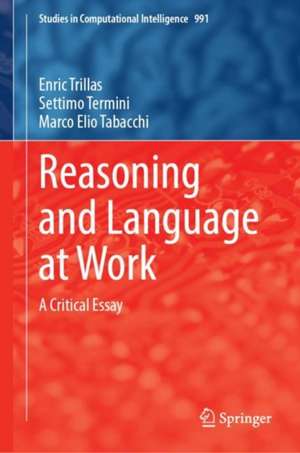Reasoning and Language at Work: A Critical Essay: Studies in Computational Intelligence, cartea 991
Autor Enric Trillas, Settimo Termini, Marco Elio Tabacchien Limba Engleză Hardback – 15 feb 2022
This book is recommended to young researchers that are interested in either the scientific or philosophical aspects of computational thinking, and can further the debate between the two approaches.
| Toate formatele și edițiile | Preț | Express |
|---|---|---|
| Paperback (1) | 808.32 lei 6-8 săpt. | |
| Springer International Publishing – 16 feb 2023 | 808.32 lei 6-8 săpt. | |
| Hardback (1) | 814.40 lei 6-8 săpt. | |
| Springer International Publishing – 15 feb 2022 | 814.40 lei 6-8 săpt. |
Din seria Studies in Computational Intelligence
- 20%
 Preț: 449.37 lei
Preț: 449.37 lei - 20%
 Preț: 1158.26 lei
Preț: 1158.26 lei - 20%
 Preț: 986.66 lei
Preț: 986.66 lei - 20%
 Preț: 1452.76 lei
Preț: 1452.76 lei - 20%
 Preț: 168.78 lei
Preț: 168.78 lei - 18%
 Preț: 1112.30 lei
Preț: 1112.30 lei - 20%
 Preț: 565.38 lei
Preț: 565.38 lei - 20%
 Preț: 649.28 lei
Preț: 649.28 lei - 20%
 Preț: 1047.73 lei
Preț: 1047.73 lei - 20%
 Preț: 1578.96 lei
Preț: 1578.96 lei - 20%
 Preț: 643.50 lei
Preț: 643.50 lei - 20%
 Preț: 657.49 lei
Preț: 657.49 lei - 20%
 Preț: 993.28 lei
Preț: 993.28 lei - 20%
 Preț: 990.80 lei
Preț: 990.80 lei - 20%
 Preț: 989.96 lei
Preț: 989.96 lei - 20%
 Preț: 1165.69 lei
Preț: 1165.69 lei - 20%
 Preț: 1444.52 lei
Preț: 1444.52 lei - 20%
 Preț: 1041.96 lei
Preț: 1041.96 lei - 20%
 Preț: 1047.73 lei
Preț: 1047.73 lei - 20%
 Preț: 1046.06 lei
Preț: 1046.06 lei - 18%
 Preț: 2500.50 lei
Preț: 2500.50 lei - 20%
 Preț: 989.13 lei
Preț: 989.13 lei - 20%
 Preț: 1165.69 lei
Preț: 1165.69 lei - 20%
 Preț: 1164.05 lei
Preț: 1164.05 lei - 20%
 Preț: 1042.79 lei
Preț: 1042.79 lei - 20%
 Preț: 1460.19 lei
Preț: 1460.19 lei - 18%
 Preț: 1403.52 lei
Preț: 1403.52 lei - 18%
 Preț: 1124.92 lei
Preț: 1124.92 lei - 20%
 Preț: 1039.47 lei
Preț: 1039.47 lei - 20%
 Preț: 1008.11 lei
Preț: 1008.11 lei - 20%
 Preț: 1045.25 lei
Preț: 1045.25 lei - 20%
 Preț: 1275.42 lei
Preț: 1275.42 lei - 20%
 Preț: 1040.32 lei
Preț: 1040.32 lei - 20%
 Preț: 988.32 lei
Preț: 988.32 lei - 20%
 Preț: 1169.79 lei
Preț: 1169.79 lei - 20%
 Preț: 1162.37 lei
Preț: 1162.37 lei - 20%
 Preț: 1059.26 lei
Preț: 1059.26 lei - 20%
 Preț: 1164.05 lei
Preț: 1164.05 lei - 20%
 Preț: 1166.52 lei
Preț: 1166.52 lei - 20%
 Preț: 1459.38 lei
Preț: 1459.38 lei - 18%
 Preț: 1005.74 lei
Preț: 1005.74 lei - 20%
 Preț: 997.38 lei
Preț: 997.38 lei - 20%
 Preț: 1055.94 lei
Preț: 1055.94 lei - 20%
 Preț: 1284.47 lei
Preț: 1284.47 lei - 20%
 Preț: 994.08 lei
Preț: 994.08 lei - 20%
 Preț: 1048.72 lei
Preț: 1048.72 lei - 20%
 Preț: 1066.02 lei
Preț: 1066.02 lei - 20%
 Preț: 943.78 lei
Preț: 943.78 lei - 20%
 Preț: 1173.10 lei
Preț: 1173.10 lei - 20%
 Preț: 1457.72 lei
Preț: 1457.72 lei
Preț: 814.40 lei
Preț vechi: 1018.00 lei
-20% Nou
Puncte Express: 1222
Preț estimativ în valută:
155.84€ • 161.65$ • 129.95£
155.84€ • 161.65$ • 129.95£
Carte tipărită la comandă
Livrare economică 27 martie-10 aprilie
Preluare comenzi: 021 569.72.76
Specificații
ISBN-13: 9783030860875
ISBN-10: 3030860876
Pagini: 108
Ilustrații: XXIII, 108 p. 6 illus., 4 illus. in color.
Dimensiuni: 155 x 235 mm
Greutate: 0.37 kg
Ediția:1st ed. 2022
Editura: Springer International Publishing
Colecția Springer
Seria Studies in Computational Intelligence
Locul publicării:Cham, Switzerland
ISBN-10: 3030860876
Pagini: 108
Ilustrații: XXIII, 108 p. 6 illus., 4 illus. in color.
Dimensiuni: 155 x 235 mm
Greutate: 0.37 kg
Ediția:1st ed. 2022
Editura: Springer International Publishing
Colecția Springer
Seria Studies in Computational Intelligence
Locul publicării:Cham, Switzerland
Cuprins
Part 1: Reasoning.- Introduction.- Trying to Define the Main Problem. Measurable Meaning.- A Formal Skeleton of Commonsense Reasoning.- Examples on the Analysis of Statements Through Design.- The Problem of Monotonicity and the Skeleton.- Conclusions For Part 1.- Part 2: From a Perceptive Point of View.- Introduction.- The Linguistic Continua.- Quasi-Transitivity.- Context, Inference’s Safety, Proving and Further Comments.- Conclusions for Part 2.- Part 3: Fuzzy Calculi, the Context and Historical Roots.- An Overview on Fuzzy Calculi.- Common Reasoning in a Computational Context.- Looking for Some Historical Roots.- The End: General Conclusions.
Textul de pe ultima copertă
This book furthers the historical and technical debate by looking at reasoning as the action of language when it is devoted to explaining or foretelling, based on the authors’ centennial combined experience in fuzzy logic. A simple logical model mixing abductions and deductions is introduced in order to attain speculations, conjectures that may be responsible for induction, and creativity in reasoning. A central point and a dire hypothesis of the book are that such process can be implemented by computation and as such can lead to a new approach to automatic thinking and reasoning. On top of the technical approach, the relationship between reasoning and thinking is also analyzed trying to establish links with notions and concepts of thinkers from the European Middle Age to the current days.
This book is recommended to young researchers that are interested in either the scientific or philosophical aspects of computational thinking, and can further the debate between the two approaches.
This book is recommended to young researchers that are interested in either the scientific or philosophical aspects of computational thinking, and can further the debate between the two approaches.
Caracteristici
Is short in size but big in ideas, and has deep explanations and inspirations concerning relevant aspects Focuses on crucial issues for some artificial systems mimicking the humans exemplified Presents a remarkable source of information, explanations, and inspirations
